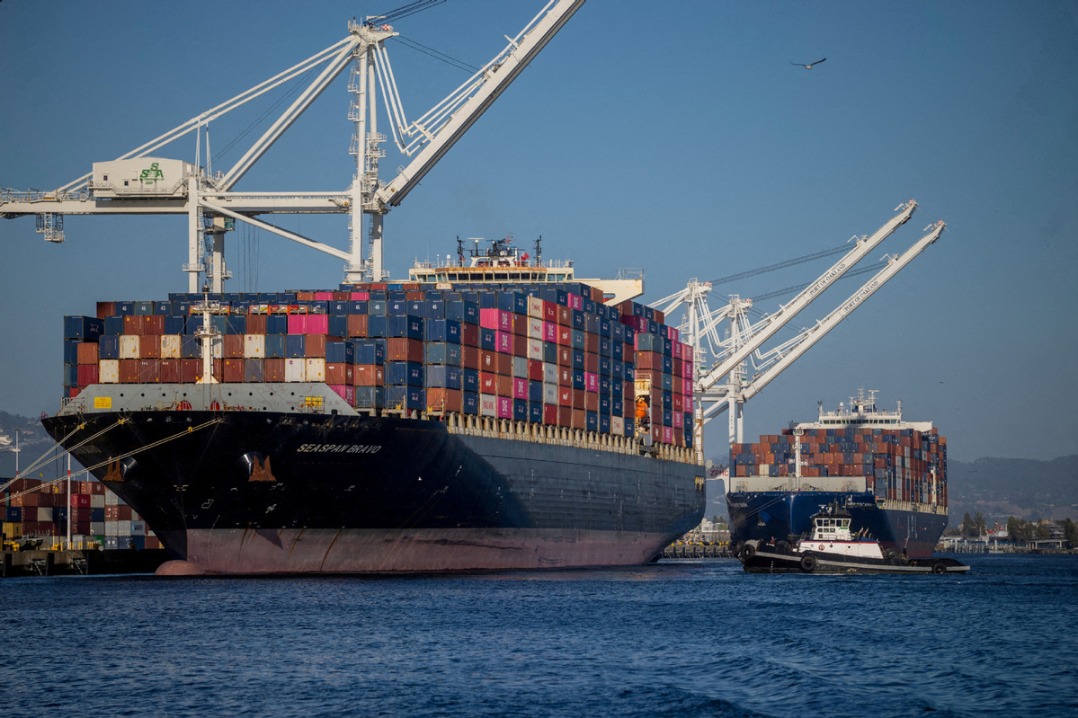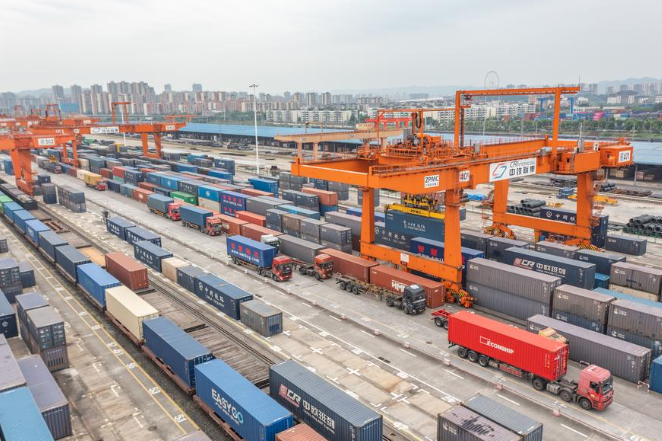US tariffs begin to bite into trade
Businesses, ports face uncertainty as Washington's duties disrupt commerce


US imports of container goods saw a big decline in September, as the effects of US-initiated tariffs on foreign nations began to bite, analysts said.
US container cargo imports in September slumped 8.4 percent year-on-year, according to the Global Shipping Report published recently by Descartes, a supply chain technology and data provider. It included a significant 22.9 percent fall in cargo from China.
David A. Gantz, an economist at the Baker Institute at Rice University, told China Daily that the US administration's tariffs on "goods imports from virtually all US trading partners will have a negative impact".
But, even amid the slowdown, US ports still handled 2.31 million 20-foot equivalent units of container cargo last month, the third-highest September volume on record, according to Descartes.
The steepest decline in imports was mainly toys and sporting goods, footwear and apparel, aluminum and electric machinery, Descartes found.
It stood in contrast to the high number of goods sent in July and August as retailers got stock ahead of the US holiday seasons of Thanksgiving and later Christmas.
National Retail Federation's Vice-President of Supply Chain and Customs Policy Jonathan Gold told China Daily that it was because "retailers have been working to mitigate the impact of tariffs for some time", including front-loading cargo when possible… as "the uncertainty around the tariffs is challenging for businesses".
The number of monthly import cargo volumes at the US' major container ports is projected to drop below the 2 million TEU mark for the rest of the year, the federation said.
Gold said the peak season occurred much earlier in the year, as businesses tried to avoid being hit by tariffs. Other analysts also expect the end of the year's imports to slow further.
"Ongoing volatility in US tariff policy is creating significant economic uncertainty, with trade volumes expected to see unpredictable shifts over the next four to six months," said Ben Hackett, founder of Hackett Associates, a maritime research firm, in a statement.
"Many large companies preemptively imported goods to build up inventories, but as those stockpiles are depleted, the full inflationary impact of the tariffs will become apparent," he added.
China's share of total US imports fell to 33 percent in September from 34.5 percent in August, Descartes added.
The slowing of imports year-over-year was also seen at one of the busiest ports in the US last month.
In California, the Port of Los Angeles reported that it had processed around 883,000 container units in September. At least 460,000 of those TEUs were loaded with imports, an 8 percent decline from the same time last year.
Short of expectations
Port of Los Angeles Executive Director Gene Seroka told reporters on Oct 15: "We're past peak season and expect to see cargo volume soften over the last three months of the year. And of course, ongoing turbulent negotiations with our largest trading partner could intensify that decline."
Washington said on Oct 10 that it would put an additional 100 percent tariff on Chinese goods on top of existing levies, starting on Nov 1, after Beijing's announcement that it would place new export controls on rare earth minerals.
China's Ministry of Commerce spokesperson He Yongqian said that the US was creating "misunderstanding" and "panic" over China's restrictions on rare earth minerals.
China announced on Oct 9 export control measures on items related to superhard materials, rare earth equipment and materials, and batteries.
The Ministry of Commerce spokesperson He later said it was but a normal effort to improve the country's export control system in accordance with laws and regulations, and was not targeted at any specific country or region. Those measures constituted a legitimate practice designed to prevent the illegal use of rare earths, such as use in weapons of mass destruction, thereby safeguarding China's national security and global common security, she added.
The spokesperson also criticized Washington for taking moves to jeopardize bilateral trade relations after the Madrid economic and trade talks between the two sides last month. Since then, the US has introduced 20 measures to suppress China in just over 20 days, seriously damaging China's interests, she said.
Data show that trade between the two nations has been impacted due to the tariffs.
China's exports to the US fell 27 percent year-on-year in September, despite its global exports hitting a six-month high, according to Chinese customs data. Overall, China's exports to the US have fallen for six months straight.
Trade wars have no winners, China's Ministry of Commerce has repeatedly cautioned.
belindarobinson@chinadailyusa.com

































